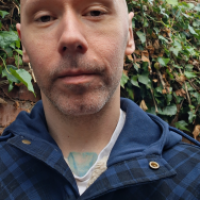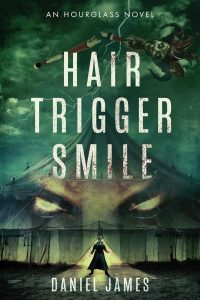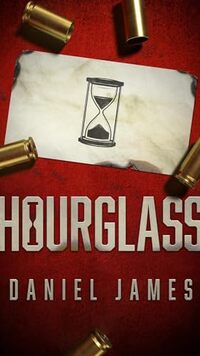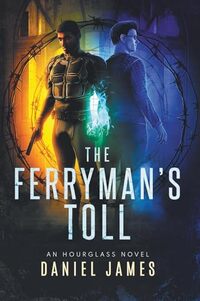Can you tell us about the inspiration behind your Hourglass series? What sparked the idea for this supernatural fantasy thriller?
Basically, I wanted to re-use Clyde and Kev, two characters from the first books I wrote when I first started writing. That original series was full of ambition, but very little technical writing experience; thankfully, all copies have been expunged from the earth! Still, I liked a lot of the ideas, and the overall vibe of those amateurish books, and decided to start from scratch, but keeping Clyde and Kev, and making them the central protagonists, rather than sidekicks. That was the first step. After that, I just wanted to write from the heart, and my heart is full of varied influences, which I think, is why the series can be tricky to pigeonhole.
How does living in Liverpool influence your writing and the worlds you create?
Truthfully, it doesn’t. I never felt comfortable growing up in this city, for no specific reason. I feel a bit less alienated now, but as someone who never had any real love for their hometown, I intentionally wrote my earlier books in either fictional or factual US towns/cities, purely because of heavy exposure through the books/movies/TV I enjoyed. I did write a horror novel set in Liverpool about modern day druids and their ancient blood feud with an aristocratic Catholic family cursed long ago to be a bunch of unholy mutants, but I wasn’t happy with it, and so scrapped it. I do, however, intend to write a UK set Hourglass spin-off called Onslow Hawkins is Immortal, when I’m done with the original series, and I’ll probably bounce it between Liverpool and London.
You received three Kirkus Star reviews for your books. How has this recognition impacted your writing career and personal outlook?
Not at all, to be honest. If I sell a single copy a month it’s a big day for me. So, it’s a good job I never started writing to become rich. I have a love/hate thing going on with writing. I’ve gone through some pretty negative headspaces about it recently, wishing I could just call it quits, but then I also know that there’s no way, for better or worse, that I can abandon the Hourglass series until it’s finished. I’m currently on book 5, and not putting the cart before the horse, I think there’s maybe 7-8 books in total needed to wrap it all up. But then there are days like today, where I love writing. So, I think as long as you’re doing it to explore and purge your imagination, it’s good motivation to keep going.
Hourglass was voted one of Kirkus Reviews' Best 100 Indie Novels of 2021. What was your reaction to this accolade, and how did it affect your approach to writing the subsequent books in the series?
It was great to hear it, and see it in the magazine, but as I mentioned in the previous question, it doesn’t translate to much more than a small ego boost, that I certainly need sometimes. At the time, it did give me some confidence. As a writer who, to this day, doesn’t feel comfortable talking about my writing—I don’t even tell people I’ve worked with for five years that I have books out—the accolade has at least made me feel a bit more comfortable, and less foolish about my desire to write a series of books.
What can readers expect from your upcoming release, Hair-Trigger Smile? How does it fit into the Hourglass series and what new elements does it introduce?
Hair-Trigger Smile is definitely where the series ramps up. I enjoy the stories and conflicts of the previous two books, but let’s just say there are some character moments in this that have major ramifications on the entire series moving forward. It also brings back another character from my original—binned, buried or burned—iteration of Hourglass, and I’m very excited about that. He was an essential component at the time, and I always intended to bring him into this series when the time was right, and Hair-Trigger Smile was that time. There’s also a sub-plot that blends the usual “real-world” supernatural-paramilitary operations of Clyde, Kev and company, with a quite bizarre and otherworldly epic fantasy quest.
You mentioned being an introvert who enjoys thinking about superheroes, horror movies, and listening to punk rock and metal. How do these interests influence your writing style and themes?
Quite significantly, actually. I tend to structure plots independently of these influences, but I tend to find a few songs that help epitomise the new manuscript; these songs are not just strictly punk or metal these days, I’m much more varied. Once I’m in the process of writing—or taking a stroll or a drive or literally anything, really— I’ll have the soundtrack playing and just visualise major plot moments like I’m watching them on a movie/TV trailer. It’s like a positive feedback loop, giving me a charge and helping me forge through each successive draft. Sometimes I’ll have the theme before the plot, like the original Hourglass book, for instance, and sometimes the themes announce themselves intuitively. But since the Hourglass series is full of monsters and paranormal “superheroics”, these little imaginary highlight reels help give me a strong vibe for what I’m aiming for.
Can you describe your writing process? Do you have any specific routines or habits that help you stay creative and productive?
Nothing too out there, frankly. I used to always ensure that I spent at least an hour or two in front of the laptop after work to chip away at a new book, but these days, I always find it much easier to write away from the house. I have a few favourite cafes dotted about where I’ll go on my days off work, and using my phone, I’ll try to get 1500-2000 words down before calling it a day.
You have a number of upcoming projects, including Nightmares in Glass and Nampires. Can you share any details about these books and what readers should look forward to?
Nightmares in Glass and Nampires are books 4 and 5 in Hourglass, respectively, so naturally, I can’t get into specifics. I can, however, say that Nightmares in Glass is a direct result of the actions of a certain character/s at the end of Hair-Trigger Smile. Too vague? All I can say about ‘Nampires is that it’s ostensibly a peculiar type of “vampire” once encountered during the Vietnam War. Add in ancient clans, demons, samurai, and the ever-heightening personal and professional tensions in the Hourglass team members, and you have ‘Nampires.
How do you balance writing with other aspects of your life, particularly since you started writing as a hobby during your studies?
To ensure I don’t suffer burnout, I now try to restrict my writing to my days off work; however, I’ll still take notes and knock ideas around on a daily basis.
What challenges did you face while transitioning from writing as a hobby to becoming a published author, and how did you overcome them?
I’m still only self-published, so there hasn’t been any transition. I wish I could quit my day job, but then, don’t we all?
How do you develop your characters and plotlines, especially in the context of speculative fiction? Are there any particular techniques or tools you use?
I don’t actually have any particular techniques for developing characters and plotlines, at least nothing unorthodox or attention-worthy. Characters either pop into my head and I’ll file them away for a future book, or for the current work-in-progress if I’m brainstorming. They’re typically bare bones at the beginning, so I’ll bounce them about to get an idea of their history and personality, and sometimes add in the traits lifted from a real person I admire, or even detest. As for plotlines, I’ll always write down the main points first, and then make a bloody incomprehensible mess of character notes and story ideas/moments. After that, I’ll do my damnedest to tidy it up. However, once I’m working through the first draft, things will typically change, major or minor, as I refine aspects of the plot or think of something better.
What themes or messages do you hope to convey through your Hourglass series and your speculative fiction work in general?
Previously, my other books have circled the themes of vengeance or underdogs, but the Hourglass series unashamedly questions some of the major foundations of human civilization, with a healthy dose of distrust for the powers that be: governments, military, federal, organised religion, definitely an anarchistic streak running through them. But there’s a glimmer of hope, too, in that our main protagonists Clyde and Kev learn that some wars actually are worth fighting for, but they’re more than a means to wave a stupid flag and satisfy a bunch of greedy, subhuman politicians and corporate leaders.
As a fan of punk rock and metal, do you have any specific bands or albums that you listen to while writing? How does music influence your creative process?
I always make playlists, and while there are certainly a bunch of artists who regularly crop up, I listen to a wide variety of music that tends to negate picking favourites. I like lots of atmospheric synthwave music, and sometimes I like lots of classic rock and pop, so there is a lot of variances, whatever catches the mood. The playlists I made for Hair-Trigger Smile and Nightmares in Glass bounced between lots 80’s metal which I love unironically. Lots of Confess, a contemporary Swedish rock band with big choruses. Ramones, Carpenter Brut, Greg Puciato.
Can you share a memorable moment or piece of feedback from a reader that has particularly resonated with you?
I don’t really have a cut-and-dry example, but a number of the reviews for the first Hourglass book on Goodreads certainly seemed to get where I was coming from, appreciating the blend of urban fantasy with militaristic overtones, comic-book influences, and even more of an epic, dark fantasy vibe with some of the story’s world-building. Actually, I suppose the review that described it as Spaced-era Simon Pegg and Nick Frost (Spaced was Edgar Wright's 90's Brit sitcom) joining Mike Mignola’s B.P.R.D. comic book made me happy. As a big fan of Spaced and Hellboy/B.P.R.D., that was nice.
Are you satisfied with the AllAuthor experience thus far? Is there anything about the site you particularly like or dislike?
I am very satisfied with my AllAuthor experience, thanks. They are very helpful with their promo campaigns.







